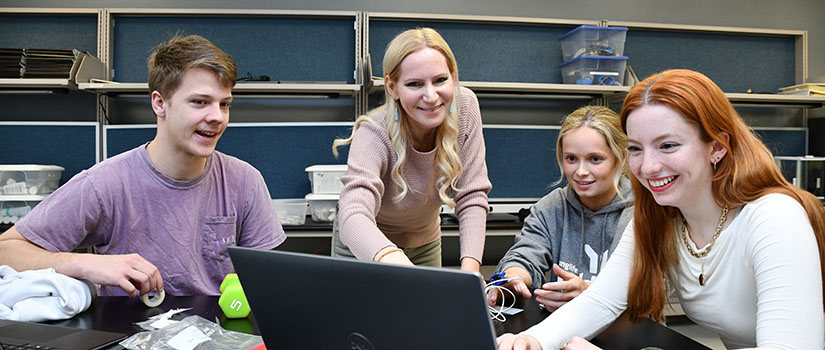Silke Henrich stays current with the changing landscape of biomedical engineering, while dedicating herself to help her students thrive and overcome obstacles.
In the realm of biomedical engineering education, Silke Henrich stands at the forefront, orchestrating a symphony of innovation and adaptation.
As lab director, instructor and undergraduate director for the Department of Biomedical Engineering, Henrich is no stranger to the dynamic nature of the field. "It's not just one course; the course and topics constantly change," she explains, shedding light on the evolving landscape of biomedical engineering.
Henrich, who is involved in the fifth reiteration of the biomedical engineering curriculum, challenges the perception of stationary education in the field. "People always think of academic education as being something very static, but it's moving. We continuously adjust to the new demands that come from industry or other constituencies," she notes.
Henrich's role extends beyond the academic bureaucracy. Acting as a bridge between students, faculty and resources, she helps navigate the challenges students face, from academic issues to housing. Henrich also emphasizes the value of personal connections.
"I’m here to assist students and serve as the interface. I have a lot of interactions with students and faculty, and I really enjoy that," Henrich says. “It’s about fostering an environment where students can thrive and overcome obstacles.”
Henrich did not have a direct journey into academia. With an industrial background at pharmaceutical companies Novartis and Columbia-based Nephron, she brings a unique perspective to academia.
“I think it's important to have different viewpoints. The worst team you can have is just a bunch of clones. I can bring something different with the experiences that I've had, but I also think personally it's good for someone to always try something new,” Henrich says.
Henrich’s global journey, from studying in Germany to earning her Ph.D. from the University of Sydney (Australia), reflects her willingness to explore the unknown.
“I don’t think there’s anything better a person can do for their professional, and more importantly, personal growth, than to step outside their bubble and broaden their horizon,” Henrich says. “It opens up a new world and new way of thinking.”
Teaching both lab and lecture-based classes, Henrich finds the intensity of lab classes more satisfying. Her versatile experience enriches her role in guiding faculty and shaping courses. "In a lab, you don’t just lecture, you demonstrate which is more effective," Henrich says.
Reflecting on her industry experience, Henrich acknowledges that her commitment to making a positive societal impact led her to academia, where she enjoys shaping the next generation of biomedical engineers. Rather than producing a product herself that helps someone, like a medical device or pharmaceutical, she teaches students who will someday do that job for her. For Henrich, teaching is more impactful than directly making medication.
“It's producing the pipeline of people who go out and do the good that I wanted to do when I first started,” Henrich says. “I enjoyed my time in industry, but when I did my Ph.D. and worked as a teaching assistant, I realized how much I love education. I like being in academia and teaching students and helping them shape their future,” Henrich says.
Senior biomedical engineering major Mina Schaafsma, who is also one of Henrich’s teaching assistants, believes that she is passionate about teaching, and it shows in the effort she makes to ensure her students correctly perform experiments.
“She is intense and stringent in lab reports and doing things the right way,” Schaafsma says. “But I feel it is coming from a place of passion for her students to do well not only in class but in life and industry. She wants students to do well after we graduate.”
Henrich's dedication to breaking gender norms in STEM education is evident. She envisions a future where diversity in the field becomes the norm, highlighting the importance of starting STEM education at an early age. "I hope we can keep it going," she says, acknowledging the positive shift she has witnessed over the years.
In a field where engineering stereotypes are being challenged, Henrich stands as a beacon of progress and transformation. As she continues to navigate the evolving landscape of biomedical engineering education, Henrich's impact reverberates through the students she guides and the programs she shapes.
